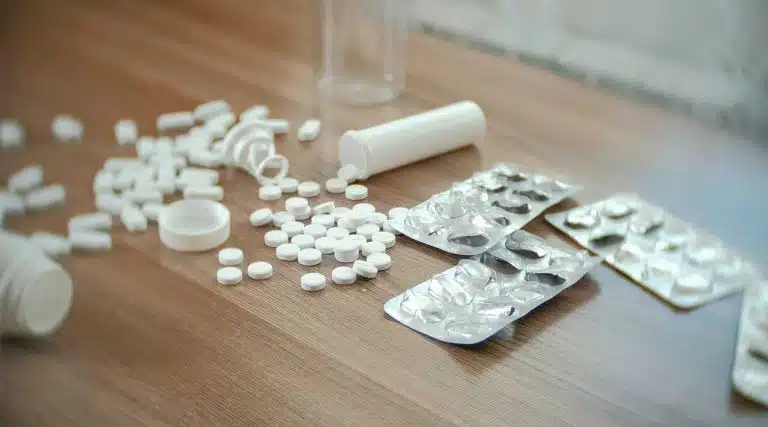Hydrocodone Overdose | How Much Hydrocodone Is Too Much?
- What Causes Hydrocodone Overdose?
- How Much Hydrocodone is Too Much?
- Overdose Symptoms
- Treatment For Hydrocodone Overdose

Hydrocodone is a prescription opioid that can lead to overdose. Hydrocodone overdose is one part of the opioid epidemic, a crisis with alarmingly high numbers of opioid abuse, addiction, and death in the United States.
Hydrocodone overdose occurs when a person takes enough hydrocodone to trigger a toxic reaction in the body. Opioid overdose can be deadly, and hydrocodone overdose is no exception.
What Causes Hydrocodone Overdose?
Hydrocodone abuse puts one at a higher risk of overdose. Hydrocodone is commonly abused by taking it in excessive amounts or mixing it with other drugs. As a pain medication, it can cause feelings of sedation and euphoria when taken.
Hydrocodone’s analgesic (pain relief) properties are appealing for people looking to escape severe pain, chronic pain, or both. A person on hydrocodone may desire stronger pain relief over time, which can lead to taking unapproved higher doses.
All of the following hydrocodone and hydrocodone combination (containing acetaminophen) prescriptions are potential targets of abuse:
If you take too much of any of these prescriptions at once, you’re at a higher risk of overdose.
How Much Hydrocodone is Too Much?
Following the recommended hydrocodone dose is the best way to avoid an overdose. Most hydrocodone pills contain between 5 mg and 120 mg of the opioid.
Like other forms of drug overdose, hydrocodone overdose is caused by too much of the drug in your body at once. The body then has a toxic reaction, which often affects vital parts of the body.
Deaths from hydrocodone overdose had average reported blood concentrations of 0.53 mg/L. Taking hydrocodone in normal doses will not come close to this concentration and is not toxic. Even 120 mg hydrocodone capsules are extended-release, and safely enter the bloodstream throughout the day.
If you’re taking more than the recommended dosage of hydrocodone, it’s likely substance abuse. By taking high doses of hydrocodone, you put large amounts of the drug in your bloodstream, increasing your risk of triggering a toxic reaction.
Lethal Dose Of Hydrocodone
The amount of hydrocodone that is toxic to your body will depend on factors such as body weight, frequency of use, and drug tolerance. While there is no specific number of pills or tablets that will automatically cause an overdose, increased doses lead to increased risk.
Hydrocodone Overdose Symptoms
Hydrocodone overdose affects the central nervous system (CNS), which includes the brain. Overdosing can affect vital bodily functions, and can be life-threatening.
Side effects of hydrocodone overdose include:
- drowsiness
- respiratory depression (extremely slow breathing)
- general breathing problems (difficulty breathing, shallow breathing)
- clammy skin
- slowed heart rate
- low blood pressure (hypotension)
- pinpoint pupils
- weak pulse
Get medical help immediately if you or a loved one exhibit these signs.
Treatment Options For Hydrocodone Overdose
Hydrocodone overdose is only one part of an ongoing opioid epidemic. To help fight it, treatment exists for both emergency overdose situations and for people looking to stop an overdose before it happens.
Overdose Reversal Treatment
Naloxone is a highly effective treatment for many types of opioid overdose. It binds to opioid receptors in the brain, and can help restore normal breathing in someone who has just overdosed on hydrocodone.
Naloxone comes in injectable and nasal spray forms, and should be administered immediately to start treating overdose effects.
While naloxone is not a substitute for proper medical attention, it is a vital form of first aid for hydrocodone overdose. Naloxone is even more effective when combined with proper medical treatment.
Addiction Treatment
Several types of treatments can prevent hydrocodone overdose before it happens. If you see yourself or a loved one struggling with hydrocodone abuse, getting professional help reduce the risk of overdose.
Medications such as methadone and buprenorphine can reduce cravings and withdrawal symptoms for hydrocodone. Behavioral therapy helps you recognize and avoid triggers that could cause you to relapse.
While addiction treatment can be difficult and uncomfortable, they aim to stop drug abuse, prevent a potential overdose, and help you live a healthier life.
Contact us today to learn more about opioid overdose and our treatment options for prescription painkiller addiction.
Written by Ark Behavioral Health Editorial Team
©2024 Ark National Holdings, LLC. | All Rights Reserved.
This page does not provide medical advice.
Centers for Disease Control and Prevention - Understanding the Epidemic | Drug Overdose | CDC Injury Center
Food and Drug Administration (FDA) - HYSINGLA (HYDROCODONE BITARTRATE) Label
National Institute on Drug Abuse - Opioid Overdose Reversal with Naloxone (Narcan, Evzio) | National Institute on Drug Abuse (NIDA)
U.S. National Library of Medicine - Hydrocodone | C18H21NO3 - Pubchem

Questions About Treatment?
Ark Behavioral Health offers 100% confidential substance abuse assessment and treatment placement tailored to your individual needs. Achieve long-term recovery.
100% confidential. We respect your privacy.
Prefer Texting?
Our friendly support team is here to chat 24/7. Opt out any time.







 Learn More
Learn More








